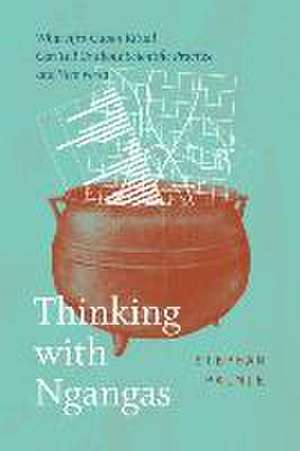Thinking with Ngangas – What Afro–Cuban Ritual Can Tell Us about Scientific Practice and Vice Versa
Autor Stephan Palmiéen Limba Engleză Hardback – 2 apr 2024
Inspired by the exercises of Father Lafitau, an eighteenth-century Jesuit priest and protoethnographer who compared the lives of the Iroquois to those of the ancient Greeks, Stephan Palmié embarks on a series of unusual comparative investigations of Afro-Cuban ritual and Western science. What do organ transplants have to do with ngangas, a complex assemblage of mineral, animal, and vegetal materials, including human remains, that serve as the embodiment of the spirits of the dead? How do genomics and “ancestry projects” converge with divination and oracular systems? What does it mean that Black Cubans in the United States took advantage of Edisonian technology to project the disembodied voice of a mystical entity named ecué onto the streets of Philadelphia? Can we consider Afro-Cuban spirit possession as a form of historical knowledge production?
By writing about Afro-Cuban ritual in relation to Western scientific practice, and vice versa, Palmié hopes to challenge the rationality of Western expert practices, revealing the logic that brings together enchantment and experiment.
Preț: 573.80 lei
Preț vechi: 745.21 lei
-23% Nou
Puncte Express: 861
Preț estimativ în valută:
109.80€ • 115.95$ • 91.37£
109.80€ • 115.95$ • 91.37£
Carte tipărită la comandă
Livrare economică 13-27 ianuarie 25
Preluare comenzi: 021 569.72.76
Specificații
ISBN-13: 9780226825922
ISBN-10: 0226825922
Pagini: 288
Ilustrații: 9 halftones
Dimensiuni: 152 x 228 x 23 mm
Greutate: 0.59 kg
Ediția:First Edition
Editura: University of Chicago Press
ISBN-10: 0226825922
Pagini: 288
Ilustrații: 9 halftones
Dimensiuni: 152 x 228 x 23 mm
Greutate: 0.59 kg
Ediția:First Edition
Editura: University of Chicago Press
Notă biografică
Stephan Palmié is the Norman and Edna Freehling Professor of Anthropology at the University of Chicago and the author of Wizards and Scientists: Explorations in Afro-Cuban Modernity and Tradition and The Cooking of History: How Not to Study Afro-Cuban Religion, the latter also published by the University of Chicago Press.
Cuprins
Preface
Introduction
Chapter 1 EP and the Problem of Other Worlds
Chapter 2 Thinking with Ngangas about Transplant Surgery, Personhood, and the Limits of “Objectively Necessary Appearances”
Chapter 3 Thinking with Ifá about Genomic Ancestry Profiles and “Racecraft”
Chapter 4 Thinking with Abakuá about Early Analog Acoustic Technology and the “Dialectics of Ensoniment”
Chapter 5 Thinking with the Cajón pa’ los Muertos about Historicist Knowledge and Its Conditions of Impossibility
Chapter 6 Thinking with Otanes about Mid-Twentieth-Century American Anthropology
Epilogue Thinking with Tomás about My Own Work
Acknowledgments
Notes
References
Index
Introduction
Chapter 1 EP and the Problem of Other Worlds
Chapter 2 Thinking with Ngangas about Transplant Surgery, Personhood, and the Limits of “Objectively Necessary Appearances”
Chapter 3 Thinking with Ifá about Genomic Ancestry Profiles and “Racecraft”
Chapter 4 Thinking with Abakuá about Early Analog Acoustic Technology and the “Dialectics of Ensoniment”
Chapter 5 Thinking with the Cajón pa’ los Muertos about Historicist Knowledge and Its Conditions of Impossibility
Chapter 6 Thinking with Otanes about Mid-Twentieth-Century American Anthropology
Epilogue Thinking with Tomás about My Own Work
Acknowledgments
Notes
References
Index
Recenzii
“Thinking with Ngangas is a major intellectual contribution delivered with flair, humor, and unfailing erudition. Via his ‘method of reciprocal illumination,’ Palmié offers a series of lively and richly perturbing essays offering insights into problems as diverse as the rationality debate, transplant surgery, anthropology’s ontological turn, genomic identity realization, acoustic technology, and the future of anthropology itself.”
“In this highly original and thought-provoking encounter between anthropology and philosophy, Palmié thinks with some of his most dramatic ‘finds’ from decades contemplating the ethnographic interface with Afro-Cuban religion. Playful and utterly earnest, this book will have you savoring historical ironies and rethinking anthropology’s foundational questions about cultural difference.”
